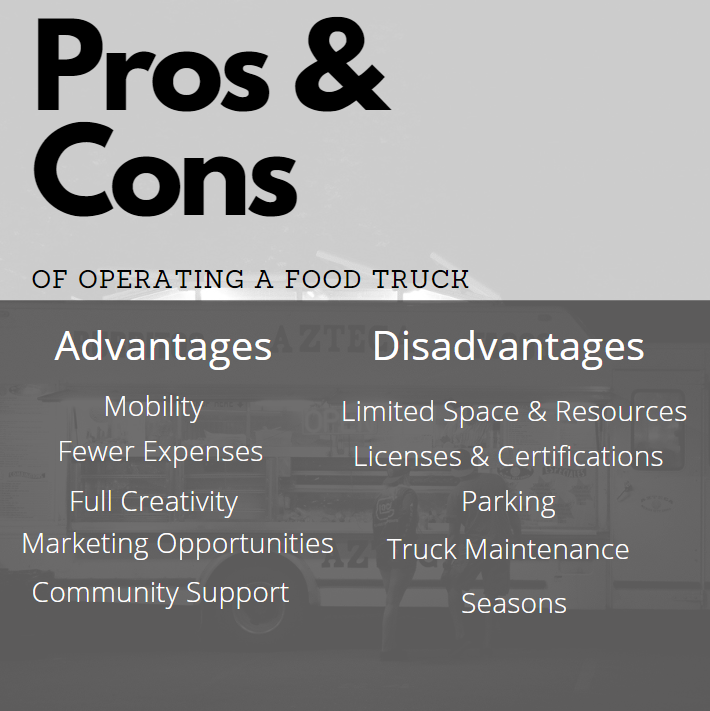(Updated May 10, 2024)
The food truck industry was valued at $856.7 million in 2015 and projected to increase to $140 million by 2020. Well, we all know what happened in 2020…
Statistica reported that the state of Florida has the highest number of food truck operations, with Texas following behind, California coming in third, and New York coming in fourth.
What to Know About Starting a Food Truck Business
So, you want to start a food truck business? This business endeavor is not for the faint of heart. Many rookie cooks and chefs think that starting a food truck business will be easier than starting a storefront restaurant. While the food truck business alleviates some concerns and responsibilities of brick-and-mortar restaurant operations, they carry unique challenges. With any company large or small, there are some pros and cons to launching and keeping a business operation afloat.
The food truck industry was valued at $856.7 million in 2015 and projected to increase to $140 million by 2020. Well, we all know what happened in 2020…
The pandemic hit the restaurant industry hard. But here’s the thing: we all gotta eat, right? Also, who feels like cooking every day, especially after being quarantined and forced to cook?
With the Great Resignation and people trying to figure out another way to make a buck, why not consider the food truck business? Your menu doesn’t have to be that big. All you need is a couple good items. Surely, you came up with something during all that time inside, right? Ok, I know I’m making this sound easy. Nothing valuable ever is.
So while the food truck catering industry can be profitable, it’s still good business practice to conduct extensive research before investing in this business. Here is a quick go-to guide to help you weigh some of the advantages and disadvantages of owning a food truck.
Advantages of Owning a Food Truck
Starting your own food truck business and having the freedom to go wherever you want seems far easier than establishing a restaurant in a brick-and-mortar building waiting for people to come thru your doors. Food trucks don’t confine you to one location like a traditional restaurant space. With a food truck, you go to the customer and if that location dries out, then you drive to another location. You are your own boss. You have the flexibility to organize a weekly or monthly schedule to map out where your food truck will be. You can also strategize and plan for your truck to park at specific locations like workplaces, events, and even other cities.
- Fewer Expenses
A food truck’s expenses are relatively lower than operating a brick-and-mortar restaurant. Food trucks are relatively less expensive to start. There aren’t any building regulations to adhere to or a dining room that you have to decorate and maintain. In all, it doesn’t require a lot of capital to launch a food truck business. Still, KultureKonnect.com stated that starting one can cost anywhere from $50,000 and up. A decent food truck could cost at least $15,000. However, it is possible to get a truck for far less. While these numbers are costly, it’s still less expensive than starting a brick-and-mortar restaurant business. Once you get past the start-up expenses, all the profits earned are yours to keep. Many food truck owners are sole proprietors or operate as an LLC. This means that there is no board of directors or franchisers to consult who will take a percentage of the profits. However, it’s not uncommon to for some food truck owners to take on a partner to split the profits with.
- Full Creativity
The food truck industry tends to be more forgiving when it comes to breaking any culinary rules. To operate a food truck, you don’t have to be a trained or certified chef. You just have to cook good food! Food truck owners also tend to have a bit more room for creativity when it comes to branding their business and creating a unique menu. Their style and cuisine can be as traditional or eclectic as the community they serve. From the decorative brand wrapping of a truck to the unique style of plating, food trucks have a reputation for coloring outside the lines when it comes to selling cuisine. It’s rare to see a food truck serving a traditional entree without some sort of ingenious culinary twist, but they’re out there! If the food tastes good, hungry customers will buy it!
- Marketing Opportunities
The flexibility of locations that food truck operations have bring in great marketing opportunities. Your truck is a mobile billboard on wheels! Every location offers a chance for you to spread the word about your business. Marketing is associated with the product. Think of how excited you got when the ice cream truck slowly rolled down your street. That type of marketing was a brightly colored vehicle blasting carnival music from its speakers. One purchase from that food truck and your ears would perk up anytime you’d hear the faint sound of carnival music on your street! While music might not be the siren to beckon customers to food trucks today, truck owners must rely on more savvy marketing practices to stay relevant and boost sales. Contacting local organizations and partnering with businesses is a great way to connect your food truck catering business with the community to increase awareness about your food truck.
- Strong Sense of Community
Without community support, it will be challenging for food trucks to thrive. The food truck industry requires you to be more involved in your community. It is your job to discover locations where your food will sell. While places with high foot traffic like a downtown area are a coveted spots, it’s also beneficial to research what other events are occurring around your city so that you can conveniently park there and sell your food! Cooks seldom get a chance to intermingle with their customers. In the food truck business, cooks can receive immediate feedback on their cuisine establishing a more personal rapport with their customers and the community.

Disadvantages of Owning a Food Truck Business
- Limited Space and Resources
Your food truck is your kitchen and pantry on wheels. There isn’t much square footage in a food truck. Most of the space is taken up by storage and cooking equipment. That’s why it’s essential to stock the right type of food truck equipment and ingredients for your menu. You might not be able to afford the luxury of making a supply run during peak business hours. Running out of ingredients can result in a loss of sales. As the sole proprietor, taking orders, preparing the food, and collecting money all fall on you. So, it’s important to take advantage of every inch of your food truck space to ensure that you’re stocking as many relevant ingredients as possible for the day’s service.
- Challenges of Getting Licenses and Certifications
The biggest hurdle to owning a food truck business is overcoming the challenges of obtaining the right type of licensing and certifications. This is the less glamorous part of being your own boss. While the idea of selling food in the most populated locations is a great idea, you’ll first need permission from the city to do it. Every city has its own regulations for food truck operators. Whether you plan on operating your business in the same city or looking to cross county or state lines, it is your responsibility as a business owner to educate yourself on all of the regulations and obtain the licenses and certifications required to operate a food truck business. This usually isn’t an overnight process. It’s best to plan for this so that you’re not promoting prematurely or committing to selling in locations that you haven’t been cleared for. Most importantly, you don’t want to stock ingredients that may spoil, resulting in wasted expenses and loss of revenue.
- Parking
If you’re looking to serve food in an area with high foot traffic, you will most likely compete for prime parking locations. The whole idea of a food truck is to make your food convenient to buy. This doesn’t work if customers need to hike multiple blocks, especially when convenient brick-and-mortar food shops are around the corner. It’s also a challenge when city zoning regulations impart restrictions on how long you can park your truck, how many people you can employ in your food truck, and whether or not you can park in a metered area even if you pay for it. There’s also the responsibility of making sure you adhere to proximity restrictions to other restaurants. Some cities may even require you to obtain a lease to park in a spot. All of these parking regulations vary depending on the state. If you know which cities you plan to park your food truck in, it’s best to jump ahead and apply for those parking permits in the early stages of business planning.
- Truck Maintenance
Food truck operations come with their own set of maintenance obligations that, if ignored, can be costly. As aforementioned, a decent food truck can cost $15,000. While there are plenty of opportunities to buy or even lease a food truck for far less, you might just be prolonging the expense of maintaining your vehicle. Just as you would take your own personal vehicle in for regular maintenance and inspections, so it is with your restaurant on wheels! Many food truck owners might be more passionate about what they’re selling than the upkeep of their trucks. If your truck breaks down, you may have to pay for repair costs, all while losing out on a few days worth of sales to fix a problem that could’ve been resolved with preventative maintenance. Investing in your truck like you’re investing in your food is recommended because, without the truck, there’s no food to serve!
- Working Around the Seasons
You are at the mercy of the seasons in the food truck business. Rainy days might render lower sales than a sunny day. Warm weather may cause more people to step outside to enjoy the weather, resulting in a possible hike in sales revenue. Depending on your work environment, your work environment could be quite challenging. Some food truck owners may take the colder months off, while others may power through the elements. Statistica reported that the state of Florida has the highest number of food truck operations, with Texas following behind, California coming in third, and New York coming in fourth.
According to World Population Review, these states have the highest population in the United States, with California ranking first, Texas second, Florida third, and New York fourth.
Starting a Food Truck Business: Weighing the Good and the Bad
Having a kitchen on wheels allows you to go anywhere you want and set up shop! While the startup costs for launching a food truck catering business are relatively cheaper than a restaurant, you’ll still need substantial capital. In addition to the actual food truck, gas, and maintenance costs, other expenses like acquiring licenses, certifications, and parking permits can quickly add up. You’ll also need essential food truck equipment like internet service for point-of-sale transactions and inventory like food, cooking tools, serveware, and clean-up supplies. There’s also the expense of labor should you decide to hire help. On the other hand, you are your own boss! You set your own hours and choose where and when you want to work. You’re serving your community; hopefully, you’re doing what you love! Whether in sunny California, Florida, or New York, braving the seasonal elements, just know that there are pros and cons to everything. You just need to ask yourself if starting a food truck business is worth it!
Written by Zorina Frey – Washington, DC – USA
Feature Photo by Photo by Edward Eyer

How to Become an Independent Publisher
AMAZING!!!! A Wealth of information, that no wants to tell you about. You can be in control of your book. Wonderful…
~Rocio Vargas – Author of Echoes of My Clan
- FREE DOWNLOAD of “The Right Way to Self Publish” ebook.
- Adobe InDesign – Format your book’s interior without the hassle of readjusting your page numbers and paragraphs. Create a manageable table of contents. Free 7-day download link included.
- Adobe Photoshop – Design a professional-looking book cover without paying an artist hundreds of dollars. Free 7-day download included.
- HTML Coding – Learn basic computer coding language so that you can better manage your website and format ebooks.



Thanks for explaining why ignoring food truck maintenance will end up being costly in the long run. My sister is looking into having an old food truck remodeled so she can start using it to sell her baking specialties like cookies and pastries at local markets. I’ll share this info to make sure she avoids common mistakes while getting the hang of the food truck business!
LikeLike